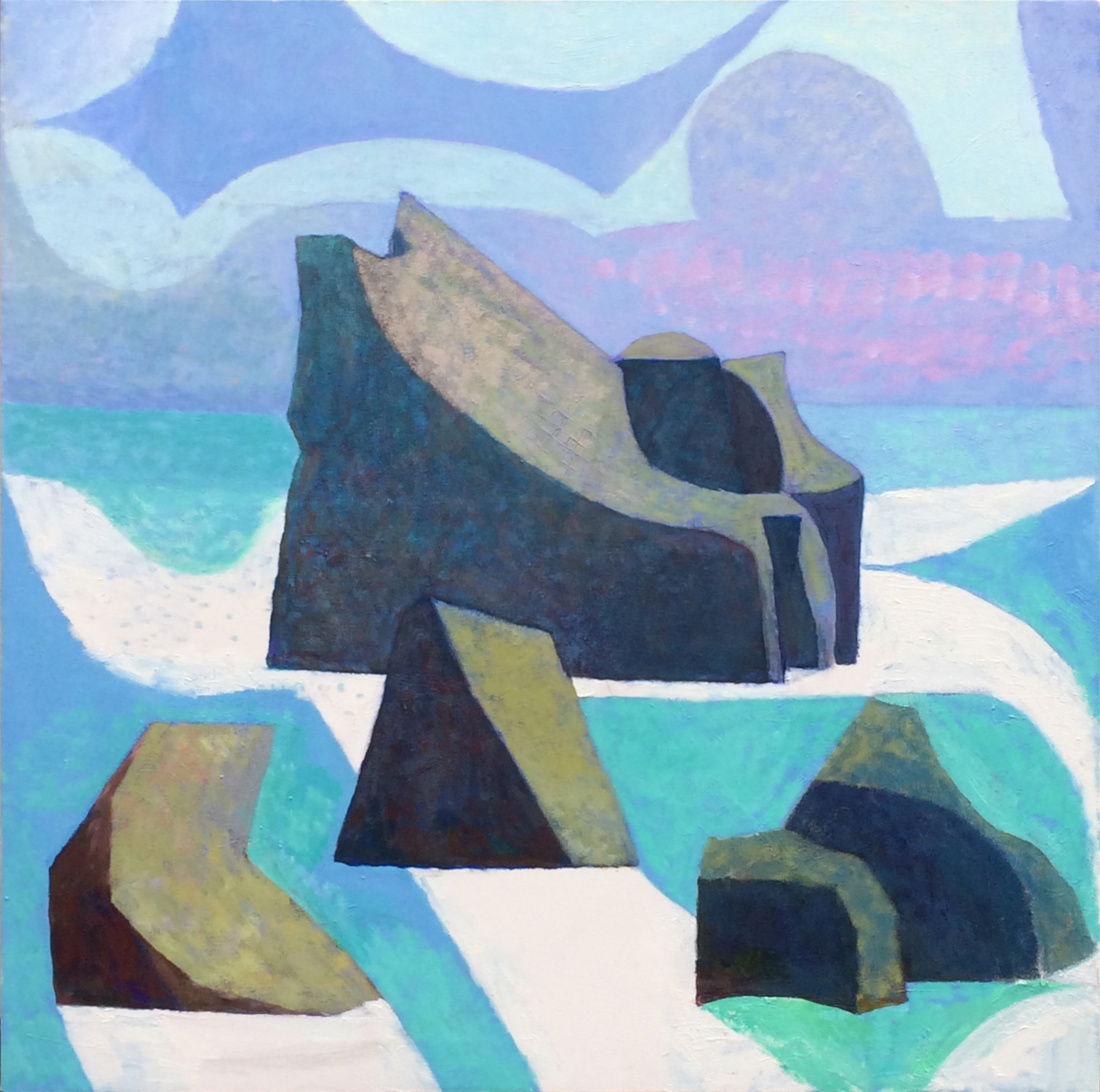
Artwork: Peter Stiles
The premise behind the exhibition “Changing Atmospheres” at Hestercombe Gardens in Somerset is that living through the pandemic has given many people, including artists, new opportunities to connect with Nature. Furlough, working from home and restrictions on travel have meant that some of us have been walking more in order to seek open spaces nearby. But there has also been a feeling that more and more people are seeking a closer relationship with the natural world; taking up gardening, getting a pet, wild swimming or visiting beauty spots.
The Gallery shows different kinds of attachments to Nature – whether it’s the emphasis on the sensual qualities of materials in the work of Alexandra Searle or the use of grass in Fiona Hingston’s hay sculptures made for her friend and neighbour, who died of Coronavirus. From painting rocks to recreating bird song you can see artists reconnecting with Nature in different ways.
If we contrast our overall attitude to Nature with that of other countries such as Japan with its earthquakes, tsunami and typhoons – we can see that in England, Nature is viewed as relatively benign. Despite the floods and storms that punctuate our history, our preoccupation with the weather is based more on a love of its changeability rather than a fear of what it will bring.
And of course the use of the word “Natural” in advertising is an indicator that your product is healthy and good.
So what effect, if any, will the virus have on this faith in the benevolence of the natural world? Do we think of the virus as natural; a successor to the many plagues that have afflicted mankind for centuries? Or is it unnatural – something that we are in some way responsible for or have even created?
The repeated warnings of imminent global disaster via climate change have become harder to ignore – not only because of record breaking temperatures and extreme weather events but because during the last few years our awareness of how dangerous Nature can be has increased. Life in general feels more unstable and fragile largely due to a series of natural microscopic mutations.
For those who feel that we have transgressed against the natural order we are experiencing something akin to a cosmic revenge (for others the laws of cause and effect are sufficient). We don’t yet know for sure how the virus originated but there seems to be a link between our treatment of animals and the possibility that the virus jumped or mutated across species. The rapid spread of the virus would certainly have been impossible were it not for our ability to move across the planet with some ease. The similarity between the repeated warnings linking an increase in carbon emissions with global travel – and the worries about the lethal transmission of a virus via ships and planes means that each message can reinforce the other.
Our definition of what is natural and artificial is complicated especially if we are linking that definition with a moral judgement. For some anti-vaxers there is an instinctive recoil from the vaccine because it is seen as unnatural (in contrast to our immune system) Distinguishing between what is natural and artificial can be both difficult and dangerous. Evolutionary theory has been used to justify behaviour including war, ruthless capitalism, sexual discrimination and the survival of the fittest on the basis that it is “natural”. And in the most artificial things that we can think of: from digital technology to food made with chemicals there is always an element of Nature. We are using the laws of physics to construct new machines or naturally occurring compounds to make new tasty snacks.
We can’t separate ourselves from Nature – there is literally nowhere else to go.
And this impossibility of separation is not only about external nature - the countryside, animals and oceans. We embody the history of our planet. Our blood, bones and consciousness are natural. A feeling of separation from Nature is the same as feeling alienated from ourselves. Going for a walk in Nature can make us feel more like ourselves. Of course a walk isn’t the only way to do this, there are thousands of ways!
In the late 18th century – the poet Samuel Taylor Coleridge lived a few miles away from Hestercombe. He once wrote a poem about “the one Life within us and abroad”
He saw the wind playing a harp that stood by an open window
“And what if all of animated nature
Be but organic Harps diversely framed
That tremble into thought, as o’er them sweeps
Plastic and vast, one intellectual breeze”
It’s a complicated poem because you can’t guess where he thinks he ends and the outside world begins. It’s a feeling of being connected with Nature that has been challenged by the pandemic but has also become more intense.
We can feel that nature is turning against us. But we have also felt more connected because we are threatened by it. The pandemic, hopefully at last on the way out, has become a chance to reconnect and take notice.
Changing Atmospheres is showing at Hestercombe Gallery until 27 February 2022.
Please help us keep Hestercombe open
Over the last 30 years Hestercombe’s historic landscape and its unique, world famous gardens have been lovingly restored.
However, Hestercombe’s closure due to the Covid-19 pandemic has had a devastating impact on Hestercombe Gardens Trust’s finances. We’re an independent charity without the safety net of larger organisations, and we must now raise substantial funds to ensure Hestercombe continues to thrive and to help secure its magnificent heritage for future generations.
We would be incredibly grateful for any donation that you are able to give. Thank you.
Gift Aid
If you are a UK taxpayer and you select ‘Please Gift Aid this donation’, the UK Government will give Hestercombe Gardens Trust an additional contribution of 25% at no extra cost to you.
